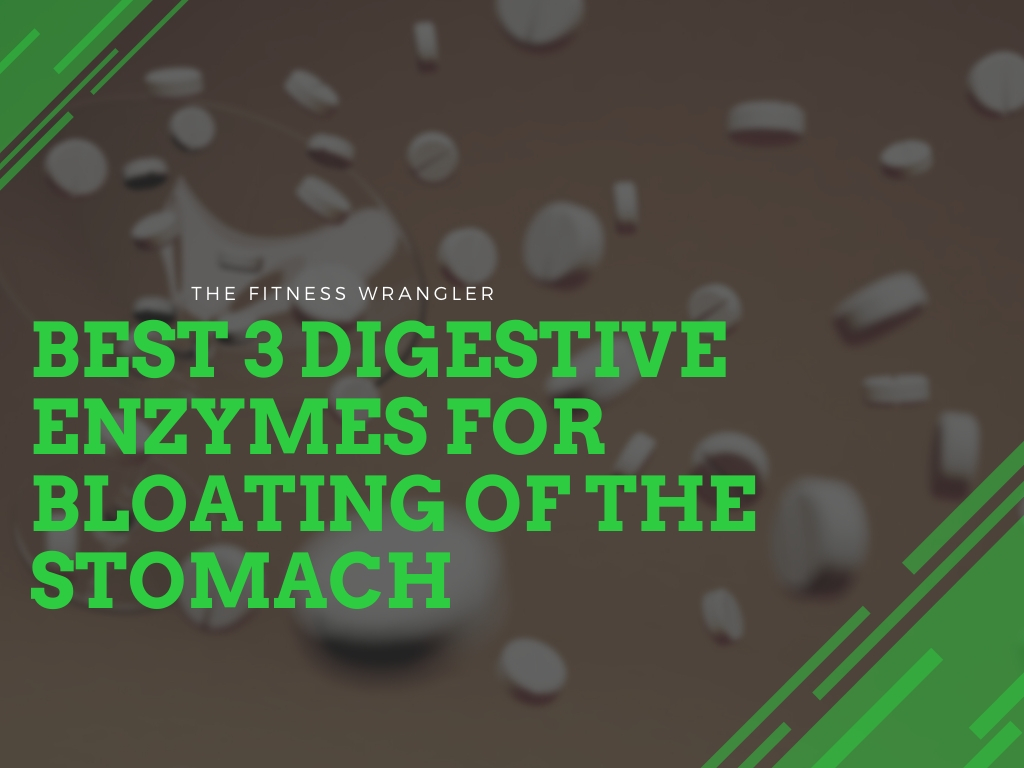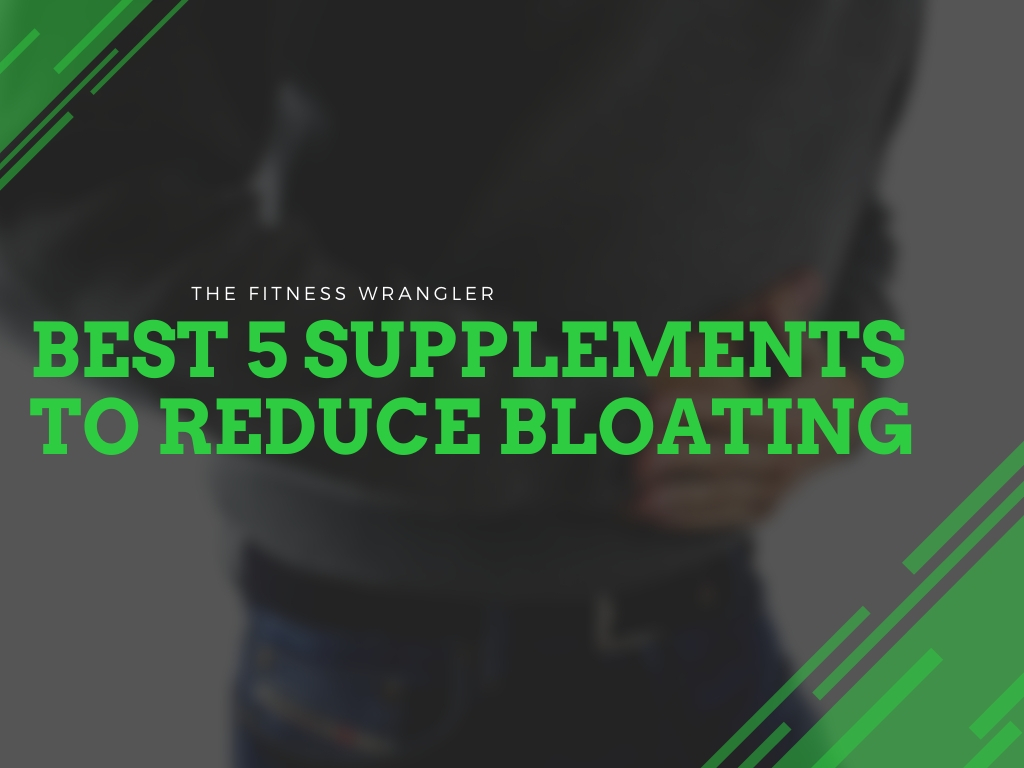No one likes feeling drained, bloated and fatigued.
There could be multiple factors for what causes stomach bloating but just taking it one step at a time to identify the foods that may be causing harm and then adding in supplements might help.
At The Fitness Wrangler we write and speak about gut health, getting control of our fitness and finding healthy food with the lowest amount of “junk” put in it.
In this article we’ll first go into a little background of what digestive enzymes are and how to choose the right ones.
They are not a cure for bloating, always talk to your doctor, but there may be a chance they can help reduce bloating.
Then we’ll look at 3 digestive enzymes to help with any stomach or belly bloating.
How To Choose The Best Digestive Enzyme
There are over a dozen different digestive enzymes and each can help you digest a variety of different foods. If you talked with your doctor and/or a nutritionist, then you should have a pretty good idea of which type of food you need help with digesting.
Here are the nine most useful enzymes and which substances they can digest according to Sciencelearn.org:
- Amylase for starches
- Protease (pepsin) for proteins
- Protease (trypsin), Lipases, and Amylase for proteins, fats, and starches
- Peptidases, Sucrase, Lactase, and Maltase for peptides, sucrose (aka sugar), lactose (aka sugar from milk), and maltose
Another popular enzyme in many digestive enzymes is Hemicellulase, which is an enzyme that helps to break down plants like fruits and vegetables, according to globalhealingcenter.com.
What are the benefits of a digestive enzyme?
Verywellhealth.com says that taking digestive enzymes on a regular basis can help with conditions like IBS (Irritable Bowel Syndrome), Cancer, Arthritis, Muscle Soreness, side effects from medications, and more.
They can do this by helping your body to regulate itself by aiding your digestive system so that your body gets all of the nutrients that it otherwise may not be able to break down.
The most obvious case is in people who are lactose intolerant: they lack the lactase enzyme which breaks down milk sugars, causing bloating, indigestion, cramps, and/or diarrhea. If a person who is lactose intolerant were to take a digestive enzyme with lactase, then they are less likely to have these symptoms which will put less stress and strain on the body.
Things to look for that differentiate them
Many digestive enzyme supplements have a variety of ingredients/enzymes in them. Some are more targeted for people with specific problems, but if you are sensitive to several different types of foods, then you may want to consider getting a supplement that has several different enzymes.
Supplements like these typically come with 10 or more enzymes per serving or dose, and these are usually taken only once per day.
If you are a vegan/vegetarian, have dietary restrictions, or prefer foods and other products without GMOs, then put your mind at ease because many digestive enzymes are made with and without these things in mind.
What is the best way to use a digestive enzyme?
If you have never taken a digestive enzyme before, you may want to start by following the instructions that come with the one you will start taking.
If you have a sensitive stomach and experience any of the symptoms that were previously mentioned after taking the enzyme, you may want to take it earlier, before you start eating breakfast.
For those of you who are taking the digestive enzyme for a specific food that you only during a certain meal, it can be best if you wait taking it until about thirty minutes before eating at the earliest and right before you start eating at the latest.
If you are taking it for a food that you do not eat often and/or you would like to minimize the number of enzymes you are taking, you could try only taking one before eating that food. To minimize symptoms, take them at the same time as mentioned above.
Common side effects from taking digestive enzymes
If you are taking or thinking of taking digestive enzymes to alleviate moderate to severe symptoms or conditions, then you may want to talk to your doctor first if you have not yet about the possible side effects that may worsen how you feel.
According to webmd.com, the symptoms that you may be trying to relieve like cramps and diarrhea may persist or worsen from taking the supplements. More side effects may also be nausea and a bloating feeling.
If any side effects or symptoms occur for several consecutive days, with or without taking the supplements, then you should probably go see your doctor.
Precautions for using them.
Unfortunately, some people can have allergic reactions to these supplements. If this happens, then you should call 911 or your local emergency line for an ambulance right away. Signs of an allergic reaction include:
- Rash
- Swelling or itching of the face, tongue/mouth, and/or throat
- Trouble breathing
- Dizziness
Top 3 Digestive Enzymes
#1 Lean Nutraceuticals
Lean Nutraceuticals has thirteen different enzymes and can help with a variety of different causes of ingestion as well as helping to relieve multiple symptoms of a wide range of conditions including acid reflux and other stomach problems.
This particular supplement is growing in popularity for people with sensitive stomachs and those with special diets since they are vegetarian, non-GMO, gluten-free, and certified by the FDA and GMP. They are also tested by a third party facility for quality assurance on a regular basis.
If your symptoms are less severe, you may only need to take one in the morning, but if your symptoms are moderate to severe, then you may need to take the maximum dose(s): one in the morning and one in the evening, both before eating any meals.
PROS
- Can be great for people with sensitive stomachs
- Can help with food-related acid reflux
- Can help digestion with all food types
CONS
- Can take several days to weeks before improvements
- Can cause minor bloating/gas
#2 Enzymedica – Digest Gold
Enzymedica Digest Gold is possibly the most favored by people with special diets due to the fact that it is gluten free, non-GMO, soy free, vegan, kosher, and regularly tested by a third party lab for quality control.
Unlike Lean Nutraceuticals, which had to be taken once in the morning and/or once in the evening, this supplement is recommending that you take one before every meal, which means that you may have to carry the pills with you if you eat out frequently.
What some people will do is carry them around in a pill container and take them before meals if they’re not home. Doing so may be a little bit of a hassle but if there’s a chance it may help the bloating after eating it could be worth it.
PROS
- Can really help with food intolerance(s)
- Can help to relieve food-related heartburn and acid reflux
- One of the largest bottles
CONS
- Can be too large a dose for some
- Bloating can be common when first taking them
#3 Dr Tobias Digestive Enzymes
Dr. Tobias Digestive Enzymes contains up to eighteen enzymes that may help reduce any bloating of the stomach. Like the others on this list, these supplements are also routinely tested, FDA approved, and made in a GMP-certified facility.
Unfortunately, it may not be the best for you if you have dietary restrictions as it does contain dairy, soy, and wheat. However, if you are on a gluten-free diet, then you can still take these as they are gluten-free, and they are also made without any GMOs.
Unlike the other supplements, these can be taken as little as once per day, particularly in the mornings for relief for the rest of the day. Even though they smell pretty strongly, they cannot leave much of an after-taste in your mouth, even if you take it with plain water.
PROS
- Can help to relieve and prevent constipation
- Leaves little to no after-taste in the mouth
- Can prevent after-meal sluggishness
CONS
- Can take several days to weeks before any signs of improvement
- Can smell pretty strongly
Final Thoughts and Next Steps
A common question of bloating and intestinal irritability is “how to improve gut health?” Digestive enzymes might help with that to balance the gut microbiota and move away from gut dysbiosis.
The reason is that the enzymes will break up the food more so it’s easier on the digestive system to process to reduce any bloating of the stomach.
The best 3 digestive enzymes we’ve come across are Lean Nutraceuticals, Dr. Tobias Digestive Enzymes and Dr. Tobias Digestive Enzymes.
Next steps from here are simple, pick one that seems interesting and go from there. Of course making sure your doctor has cleared the use of it.
Disclaimers
I am not a doctor and do not recommend anything on this site, or blog post, for anyone without consulting with their doctor first. Please read the privacy policy for more information.
There are affiliate links in this post where I’ll get a paid fee if you purchase something from that link – it won’t cost any more to you and in some cases may even save you money.















https://waterfallmagazine.com
Very quickly this website will be famous amid all blog users, due to it’s good articles or reviews